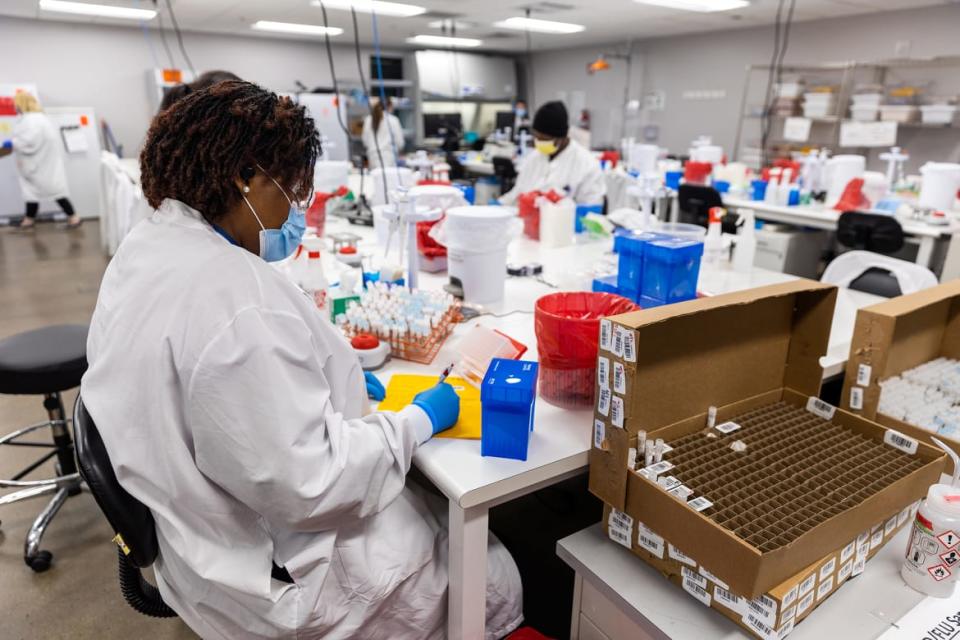New Discovery Can Kill COVID With ‘Hugs’—but There’s a Catch

Scientists have identified a molecule that just loves SARS-CoV-2, the virus that causes COVID-19. It loves it so much that it “hugs” it, practically to death—binding so tightly to the virus that the virus can’t infect our cells.
The discovery of this molecule, a so-called “HR2 peptide,” is a big deal. It could form the basis of a new kind of antiviral drug. One that should work not only on current variants of the novel-coronavirus, but future variants, as well.
But there’s a problem. It’s one thing to identify a molecule in an academic study. It’s another to create a drug based on that molecule. “Academia is not well suited to commercialize a compound,” Axel Brunger, an investigator at the Howard Hughes Medical Institute in Maryland and one of the authors of the study, told The Daily Beast.
The HR2 peptide is promising, but it’s a long way from giving us a new therapy. And resources for new COVID drugs are dwindling by the day.
The idea of deploying a peptide, which is a chain of amino acids, to bind a coronavirus isn’t exactly new. Past studies have scrutinized various peptides for use in COVID therapies, but with middling results.
Dreaded Side Effect Rears Its Ugly Head in Latest COVID Variant
The genius of the new study, which involved researchers from Harvard, Stanford, the University of Helsinki and other institutions, is in the design of the peptide. Basically, the team engineered the peptide to extend its chain of acids. “This peptide is a slightly longer version,” Brunger explained.
That seemed to do the trick. Adding a few “residues” to the amino acid chain made the peptide a hundred times more effective as a viral blocker than shorter peptides. “Our results suggest that a simple peptide with a suitable sequence can be a potent and cost-effective therapeutic,” the team wrote in its peer-reviewed study, which appeared online in the Proceedings of the National Academy of Sciences on Tuesday.
It works like this: the peptide envelops the SARS-CoV-2 virus, surrounding the spike proteins that the pathogen uses to grab onto and infect our cells. Specifically, the chain of amino acids interferes with the phase of infection where a virus wiggles its way through the membranes of our cells.
The scientists tested the peptide on all major forms of the novel-coronavirus—Delta, Omicron, the various Omicron subvariants—and the results were the same, across the board. “The peptide… strongly inhibits all major SARS-CoV-2 variants to date,” they wrote.

Microbiologists with the AEGIS Sciences Corporation process COVID-19 and Monkeypox tests at its facility in Nashville, Tennessee, on Aug. 4, 2022.
That itself is encouraging. After all, some drugs—and vaccines, too—have been losing their effectiveness as SARS-CoV-2 evolves, piling on mutations that are beginning to make the virus unrecognizable to older therapies and antibodies.
It’s a particular problem with monoclonal antibodies, one of the oldest types of COVID therapy. There are several monoclonal formulations. But only one, bebtelovimab, still works well against BA.5, the Omicron subvariant that’s currently dominant across much of the world.
It’s possible that, with the next major set of viral mutations, monoclonals won’t work at all. “There is a specific urgent need for alternative antivirals that target processes less likely to be affected by mutation,” the team behind the peptide discovery wrote.
The peptide should avoid the trap of diminishing effectiveness, Brunger explained. Where many current therapies bind the spike protein before the virus tries to grab onto our cells, the peptide binds it at a later stage, the “membrane fusion” that comes right before infection.
“The virus generally does not mutate as much in the region that is targeted by the peptide,” Brunger said. “This bodes well as a broadly applicable antiviral compound.” A drug designed around the new peptide should work equally well against current and future forms of COVID.
Unless, of course, the virus surprises us.
The science behind the peptide discovery is sound, Ali Mokdad, a professor of health metrics sciences at the University of Washington Institute for Health who was not involved in the study, told The Daily Beast. “This is very promising and a good sign for how science is moving fast.” The same peptide could have applications for diseases besides COVID, too, Mokdad added.
Brunger for one said he thinks the best application is a COVID therapy in inhaled form. Scientists and pharmaceutical developers have been eyeing more and more inhaled drugs and vaccines as they seek fast-acting, more lasting effects that start where COVID starts—in the throat and lungs.
This Could Be the Only Way to Beat COVID for Good
But the team that discovered the peptide is in no position to turn it into a drug. “We hope that a company would build on our research results and work towards clinical trials,” Brunger said.
Don’t hold your breath. “The challenge is that it takes time from discovery to application and sometimes adoption by the public and other scientists,” Mokdad explained. All that time-consuming work is expensive, too. Large-scale trials alone can cost hundreds of millions of dollars.
Drugs get developed and approved fastest when there’s strong government support behind them. Tens of billions of dollars in funding from the U.S. government and other rich governments helped to speed COVID therapies and vaccines from the science journals to laboratories to clinics and pharmacies.
But that support has been dropping as much of the public, and many of their leaders, move on from COVID. “One of the things we’ve spent a lot of time thinking about in the last many months… is getting us out of that acute emergency phase where the U.S. government is buying the vaccines, buying the treatments, buying the diagnostic tests,” Ashish Jha, the White House’s COVID-response coordinator, said last month.
Two years ago, a new peptide-based drug might have been a no-brainer. Today it’s a heavier lift. If a company takes a strong interest, a peptide therapy could go before federal regulators in a year or two. But it’s equally possible this promising new molecule gets stuck in the science journals, where it can’t help anyone.
Get the Daily Beast's biggest scoops and scandals delivered right to your inbox. Sign up now.
Stay informed and gain unlimited access to the Daily Beast's unmatched reporting. Subscribe now.

 Yahoo Movies
Yahoo Movies 
